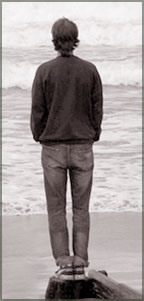Changes are wonderful
by Aditha Dissanayake
[email protected]
Q: Confronted with a world of possibilities and towering
expectations what is a graduate in English most likely to do in life?
A: Disappoint.
And despite a resume that is rather long and distinguished this is
what I had been doing after I left university. When I resigned from my
second job, the most prestigious of all the ones I have held till now, I
convinced myself "changes are wonderful". I now realize how true this
is. Now years later I feel I have arrived, by fits and starts, at a
place I have always dreamed about.
I am a writer.
So, if you too happen to be in the same shoes I was in, a few years
ago, wishing every Monday morning, you could press an invisible rewind
button and make it Friday evening again, If you are someone who responds
towards your work with pessimism or dread rather than excitement and
enthusiasm, perhaps it is time you asked yourself "What should I do with
my life?"
|

What should I do with my life? |
P. Bronson, author of a book with the above question as the title,
What Should I Do with My Life? explored this ultimate question with a
diverse group of people, young and old, each sharing how they
successfully found their true calling.
How did they do it?
According to Bronson they had courageously pushed their fears aside
and dared to be honest with themselves in pursuit of their passion.
Most of the 900 people he interviewed were searching for "a place
where they can be content, grow roots a little, and make an impact."
Here are five points to ponder from What Should I Do with My Life? to
help you figure out how to plan your future:
1. From your fears come misconceptions.
The uncertainty of exploring your passion can lead to irrational
fears and unlikely conclusions.
Many are afraid that pursuing their passion will put them in the
poorhouse.
Others fear that the path to their true calling may lead them in some
irreversible direction or limit their future options.
Bronson observes, "Often we burn 70 percent of our emotional energy
on what we fear might happen (90 percent of which won't happen)." These
psychological stumbling blocks are most often overblown, worst-case
scenarios that keep people from finding themselves. He adds, "What I
found is that, if you take care of these obstacles, you create an
environment where the truth is invited into your life." Get rid of the
fear factor and pursue your dreams.
2. Don't wait for clarity.
Many people wait and hope that their calling will come to them in the
form of an epiphany.
Don't wait for a "big moment" or a sign. Sometimes the obstacle isn't
that you don't know what makes you happy, rather it's hard to imagine
that what you love could be a profession. It's possible to bridge these
two worlds together with a little hustle, training and determination.
Having an epiphany is great, but so often they tell you something you
already know in your heart.
3. If you aren't happy, don't stay. Bronson's book is filled with
stories of real life examples of people who left jobs that compromised
their values, consumed far too much of their lives, were no longer
interesting, or created feelings of constant fatigue or insomnia.
They were doctors, lawyers and investment bankers who left the jobs
that were dragging them down and have found happiness as a massage
therapist, bakery owner or catfish farmer.
It's not selfish to deny what will make you happy. Life will evolve
naturally if you listen to your inner self and pursue what you truly
enjoy.
4. Experience speaks for itself. Real wisdom is found in experience,
yet people too often ignore the strong message of their experience. They
fail to embrace their experience because they believed their calling was
to be figured out intellectually. If you have no idea where to start,
there's some insight waiting for you in the experiences you've already
had.
For some that may mean changing sides like the oil company geologist
who was morally troubled by his environmental clean-up work.
He took a county government job to fight the very same company he
used to work for.
For others it means finding a career in doing what they love more
than anything.
Bronson shares a story of a college graduate who had held 16 jobs in
eight years. His true passion was golf and he really wanted to use his
love of the sport to help others play better. He had even designed a
golf swing trainer and putter grip.
With a little nudge and using his sales experience, he took a job
selling golf equipment and has already pitched his ideas to the United
States Golf Association (USGA).
5. Never give up. It's okay and even normal to take many years before
pursuing or discovering your calling. It's possible to have more than
one purpose in life, and you can do them together or sequentially.
It really doesn't matter as long as you are focused and pursuing them
versus chasing other unimportant things like a job title that will
impress people you don't really care about, a top-paying job that is
uninspiring or a dream that is your parents' or your spouse's and not
your own.
Finally, Norman Vincent Peale says it best.
"There is no need for you to be unhappy". Simply do a rehabilitation
job on your thoughts."
Believe you can do it and you will. |
